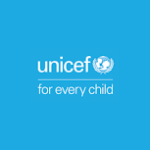UNICEF works in some of the world’s toughest places, to reach the world’s most disadvantaged children. To save their lives. To defend their rights. To help them fulfill their potential.
Across 190 countries and territories, we work for every child, everywhere, every day, to build a better world for everyone.
And we never give up.
For every child, Our Future
BACKGROUND
The fundamental mission of UNICEF is to promote the rights of every child, everywhere, in everything the organization does — in programs, in advocacy and in operations. The equity strategy, emphasizing the most disadvantaged and excluded children and families, translates this commitment to children’s rights into action. For UNICEF, equity means that all children have an opportunity to survive, develop and reach their full potential, without discrimination, bias or favoritism. To the degree that any child has an unequal chance in life — in its social, political, economic, civic and cultural dimensions — her or his rights are violated. There is growing evidence that investing in the health, education and protection of a society’s most disadvantaged citizens — addressing inequity — not only will give all children the opportunity to fulfill their potential but also will lead to sustained growth and stability of countries. This is why the focus on equity is so vital. It accelerates progress towards realizing the human rights of all children, which is the universal mandate of UNICEF, as outlined by the Convention on the Rights of the Child, while also supporting the equitable development of nations. UNICEF recognizes that gender discrimination and the marginalization of women and girls is at the core of equity issues. UNICEF overtly programs to reduce the drivers of Gender Based Violence and to ensure the care and protection of girls and women is improved wherever we work. This post is at the heart of that work.
PURPOSE
Immunization (EPI) Specialist is accountable for professional leadership in and contribution to the development, planning, implementation, monitoring and evaluation and administration of the immunization program in conjunction with Child Survival and Development, Maternal and Child Health, Health and Nutrition components within the country program, to achieve the UNICEF’s immunization plus goals and objectives for the country. Accountable for ensuring the UNICEF Immunization program promotes gender equality, with an emphasis on gender disaggregation, gender disparity identification and gender mainstreaming.
MAIN RESPONSIBILITIES AND TASKS
Within the delegated authority and under the given organizational set-up, the incumbent may be assigned the primary, shared, or contributory accountabilities for all or part of the following areas of major duties and key end-results.
1. Timely sectoral analysis, input, support and coordination contribute to the Situation Analysis with consistent integration of sex disaggregated data and its periodic update for effective project planning, development and management.
Contributes towards the preparation of the Situation Analysis by compiling, analyzing and evaluating information and providing the technical input. Ensures the preparation of the Situation Analysis relative to Immunization (EPI) interventions in the country and its periodic update. Prepares sectoral input to the Country Program Document, and all related documents (e.g., Plan of Operations, Project Plans of Action, Country Program Summary Sheet, Program Summary Sheet) of the immunization program.
2. Quality contributions are made to the development and implementation of the Immunization strategies and approaches through participation and collaboration with internal and external partners.
Collaborates with other UNICEF sectors, particularly Health, Nutrition, HIV and program communication to ensure integration of the immunization program with other sectors.
Participates with UNICEF, Government, non-government organizations (NGOs) and other partners in the development of the immunization strategies and approaches. Ensures achievement of strategic results in line with agreed Annual and Country Program objectives and adopts corrective action to meet program/project objectives.
Contributes to the identification of new approaches for improving program delivery with emphasis on project management, evaluation, sustainability of intervention and community participation based on Human Rights framework and cross sector approach to programming and Community Capacity Development.
3. Work plan and objectives are strategically established, technical support is effectively
provided, and planned results are timely delivered through exercise of strong technical leadership.
As Immunization Specialist, exercises technical leadership for, and participates in, the development of the results-based sectoral work plan and technical decisions as well as for administration, implementation, monitoring and follow-up of sectoral project activity, consistent with the defined project strategies and approaches. Ensures objectives and targets are timely met and achieved, through full coordination between activities, by leading and supporting a team of professional and support staff.
Meets with national and international agencies overseeing the management of programs/projects. Participates in meetings with ministries responsible for program/project review, and follows up on implementation of recommendations and agreements, and integration of gender mainstreaming across sectors.
4. Project implementation progress is monitored and evaluated for adjustment, acceleration and improvement of program delivery and sustainability.
Undertakes field visits to monitor programs, as well as participates in periodic program reviews with government counterparts and other partners. Identifies necessary action for program adjustments. Provides technical advice and assistance to government officials and implementing partners in the planning and management of the Immunization program and ensure sustainability of interventions. Support maintenance of information system for monitoring gender/sex disaggregated data.
5. Technical support is provided to government and NGOs at all stages of the program cooperation, including capacity building of government personnel and beneficiaries.
Provides technical support to government and NGOs at the national and provincial levels in the planning, development and implementation stages of the programs/projects. Identifies training needs; plans, organizes and conducts training and orientation activities for government personnel and beneficiaries, for the purpose of capacity building, sustainability of program/projects and promotion/expansion of coverage of services.
6. The capacities of Country Office staff and implementing partners are strengthened through effective capacity building program in the development, implementation and management of the Immunization Program.
Plans and organizes a staff training/development program to upgrade the capacity of the Country Office staff in the program development, implementation and management of the Immunization Program. Conducts relevant orientation, workshop, training and staff learning/development activities.
7. UNICEF and Government accountability is ensured for supply and non-supply assistance and disbursement of program funds for the sector.
Coordinates with Operations and Supply staff on supply and non-supply assistance activities ensuring UNICEF and Government partner accountability. Certifies disbursements of funds, ensuring those activities are within established plans of action and program budget allotments. Monitors the overall allocation and disbursement of program funds, making sure that funds are properly coordinated, monitored and liquidated. Submits financial status reports to management in compliance with the regulations and guidelines.
8. Effective partnership and collaboration achieved and maintained for advocacy, technical cooperation, program coordination, information sharing and knowledge networking.
Coordinates activities and exchanges information and knowledge with other programs to contribute to achievement of overall country program objectives. Participates in establishing effective monitoring, knowledge database/network and reporting systems to ensure the availability of current and accurate program information/data and contributes to the development of communication materials and strategies to support advocacy and community participation for the Immunization Program.
Maintains close working relationships to establish partnership and collaboration with external counterparts, including those of the UN and national partners, to improve the ability to collect and disseminate relevant data, exchange information on program/project development and implementation. Ensures exchange of knowledge, information, experience, and lessons learned.
9. The most relevant and strategic information is provided to support the Immunization Program by the effective implementation of the monitoring system.
In collaboration with monitoring and evaluation and program communication colleagues, conducts accurate and timely monitoring and data collection, and supports an integrated monitoring system.
Participates in major evaluation exercises, program mid-term review, annual sector review and preview meetings. Analyses and evaluates data to ensure achievement of objectives and recommends corrective measures as appropriate.
Ensures the accurate and timely input of project information in the monitoring system, and issues status reports for monitoring and evaluation purposes.
10. All required program reports are timely prepared in compliance with the established guidelines and procedures.
Ensures the timely preparation of annual sector status reports in compliance with the established guidelines and procedures. Participates in the preparation of all program reports for management, Board, donors, budget reviews, program analysis, and annual reports.
11. Emergency preparedness is maintained, and in emergencies, emergency responses with effective coordination are provided.
Collaborates in forming emergency preparedness plan relating to the areas of responsibility. In case of emergency, participates in monitoring and assessing the nature and extent of the emergency in the assigned area. Coordinates and provides assistance to the Country Office in identifying where support is required in terms of immediate response as well as long-term strategy and plan.
12. Other assigned duties and responsibilities are effectively performed.
Performs and delivers additional duties and services assigned by the supervisor as may be required.
MINIMUM QUALIFICATIONS & COMPETENCIES
Education:
Advanced university degree in Public Health, Pediatric Health, Child Development, Child Health, Nutrition, Epidemiology, Public Administration, Social Policy, Social Development, Community Development, or other relevant disciplines.
Work Experience:
Five years of professional work experience at the national and international levels in planning, programming, implementation monitoring and evaluation of health/Immunization programs. Professional work experience in a technical expert position related to child survival & health care. Developing country work experience (for IP) and background/familiarity with Emergency.
Language Proficiency
Fluency in English is required. Knowledge of another UN language or local language of the duty station is considered as an asset.
The competencies required for this post are:
Core Values
- Care
- Respect
- Integrity
- Trust
- Accountability
Core Competencies (For Staff without Supervisory Responsibilities) *
- Demonstrates Self Awareness and Ethical Awareness (1)
- Works Collaboratively with others (1)
- Builds and Maintains Partnerships (1)
- Innovates and Embraces Change (1)
- Thinks and Acts Strategically (1)
- Drive to achieve impactful results (1)
- Manages ambiguity and complexity (1)
*The 7 core competencies are applicable to all employees. However, the competency Nurtures, Leads and Managers people is only applicable to staff who supervise others.
For every Child, you demonstrate…
UNICEF’s Core Values of Care, Respect, Integrity, Trust, Accountability and Sustainability (CRITAS) underpin everything we do and how we do it. Get acquainted with Our Values Charter: https://uni.cf/UNICEFValues
During the recruitment process, we test candidates following the competency framework. Familiarize yourself with our competency framework and its different levels: competency framework here.
UNICEF has a zero-tolerance policy on conduct that is incompatible with the aims and objectives of the United Nations and UNICEF, including sexual exploitation and abuse, sexual harassment, abuse of authority and discrimination. UNICEF is committed to promote the protection and safeguarding of all children. All selected candidates will, therefore, undergo rigorous reference and background checks, and will be expected to adhere to these standards and principles. Background checks will include the verification of academic credential(s) and employment history. Selected candidates may be required to provide additional information to conduct a background check.
Remarks:
UNICEF’s active commitment towards diversity and inclusion is critical to deliver the best results for children. For this position, eligible and suitable female candidates are encouraged to apply.
Only shortlisted candidates will be contacted and advance to the next stage of the selection process.
UNICEF appointments are subject to medical clearance. Issuance of a visa by the host country of the duty station, which will be facilitated by UNICEF, is required for IP positions. Appointments are also subject to inoculation (vaccination) requirements, including against SARS-CoV-2 (Covid). Government employees that are considered for employment with UNICEF are normally required to resign from their government before taking up an assignment with UNICEF. UNICEF reserves the right to withdraw an offer of appointment, without compensation, if a visa or medical clearance is not obtained, or necessary inoculation requirements are not met, within a reasonable period for any reason.











